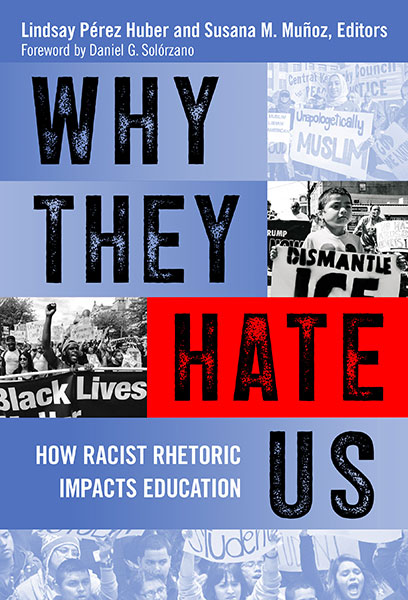Professors: Request an Exam Copy
Print copies available for US orders only. For orders outside the US, see our international distributors.
Edited by: Lindsay Pérez Huber, Susana M. Muñoz
Foreword by: Daniel G. Solórzano
Publication Date: March 5, 2021
Pages: 240

This book examines how racist political rhetoric has created damaging and dangerous conditions for Students of Color in schools and higher education institutions throughout the United States. The authors show how the election of the 45th president has resulted in a defining moment in U.S. history where racist discourses, reinforced by ideologies of white supremacy, have affected the educational experiences of our most vulnerable students. This volume situates the rhetoric of the Trump presidency within a broader historical narrative and provides recommendations for those who seek to advocate for anti-racism and social justice. As we enter the uncharted waters of a global pandemic and national racial reckoning, this will be invaluable reading for scholars, educators, and administrators who want to be part of the solution.
Book Features:
Lindsay Pérez Huber is an associate professor in the Social and Cultural Analysis of Education master’s program in the College of Education at California State University, Long Beach, and coauthor of Racial Microaggressions: Using Critical Race Theory to Respond to Everyday Racism. Susana M. Muñoz is an associate professor, program coordinator of the Higher Education Leadership Program, and co-director of CSU initiatives for the Race and Intersectional Studies for Educational Equity Center in the School of Education at Colorado State University.
“The essays in Why They Hate Us: How Racist Rhetoric Impacts Education place immigrant and undocumented students and communities at the center of the story. These nine essays are excellent examples of anti-racist-nativist research and testimonios to the strength and power of the undocumented community and provide a roadmap toward truth, resistance, and triumph.”
—From the Foreword by Daniel G. Solórzano, professor and director of the Center for Critical Race Studies in Education, University of California, Los Angeles
“This volume provides a comprehensive review of the impacts of Trumpism in the U.S. educational system at all levels. Centering the voices of minoritized students, each chapter provides an in-depth look at the effect racist nativist practices have had on the educational experiences of students from different backgrounds and in different educational settings. Beautifully argued, this book is a must-read for scholars and educators interested in understanding how our educational system got to this point and what it will take to create a truly antiracist educational system in the United States.”
—Lisa García Bedolla, vice provost for graduate studies and dean of the graduate division, graduate school of education, University of California, Berkeley
“Why They Hate Us is a magnificent book, valuable historically, politically, culturally, and practically. The authors provide an insightful historical synthesis of the anti-Latinx movement and how it came to be a centerpiece of Trump’s jingoistic rhetoric. The authors expertly draw from media stories, speeches, and campus incidents to illustrate the context of hatred endured by Latinx citizens and immigrants in the era of ‘Make America Great Again,’ while also noting the resistance it has awakened in young and adult students, their teachers, and the authors of this book.”
—Estela Mara Bensimon, university professor emerita and founder, Center for Urban Education, Rossier School of Education, University of Southern California
“Pérez Huber and Muñoz have crafted a timely, thoughtful, and critical volume that addresses hatred, racist nativism, and anti-immigrant sentiments and their broad impact under the Trump Administration. More important, this book centers the educational experiences of Latina/o/x, immigrant, and/or undocumented students whose lives have been disproportionately targeted due to hateful and unfounded rhetoric. This book is a definite must-read for educators, practitioners, researchers, and policymakers committed to disrupting racist nativism and achieving educational equity.”
—Lori Patton Davis, chair, Department of Educational Studies, The Ohio State University
Contents
Foreword Daniel G. Solórzano vii
Acknowledgments xv
Introduction: Racist Rhetoric in the United States: A Brief History, From the “Southern Strategy” to “Make America Great Again” 1
Lindsay Pérez Huber
1. Historical and Contemporary Articulations of White Supremacist, Anti-Immigrant, and Racist Rhetoric 27
Susana M. Muñoz
2. Not “A Good Example for Children”: Racist Speech in America’s High Schools in the Age of Trump 49
John Rogers and Michael Ishimoto
3. Praxis of Resilience and Resistance: “We Can STOP Donald Trump” and Other Messages From Immigrant Children 71
Silvia Rodriguez Vega
4. “You Can’t Learn If You Don’t Feel Safe”: Educators Working With Undocumented High School Students 93
Carolina Valdivia, Marisol Clark-Ibáñez, Josefina Espino, and Carolina Lopez
5. Xenophobia at the U.S.–Mexico Border: The Impacts of Anti-Latina/o/x and Anti-Immigrant Discourse on Transfronterista Community College Students 120
Tanya J. Gaxiola Serrano
6. Racist Nativist Microaggressions in the Trump Era: Experiences of DACA and Undocumented Latinx College Students 140
Valerie A. Gomez, Darsella Vigil, Lindsay Pérez Huber, and Susana M. Muñoz
7. “I Am Not Your Victim”: Intersectional Religious Marginalization and Resistance Among Black Muslim Immigrant and Refugee College Students 162
Naruro Hassan, Saskias Casanova, and Keon M. McGuire
Conclusion: The Racism Pandemic 187
Lindsay Pérez Huber and Susana M. Muñoz
About the Contributors 206
Index 212
Professors: Request an Exam Copy
Print copies available for US orders only. For orders outside the US, see our international distributors.